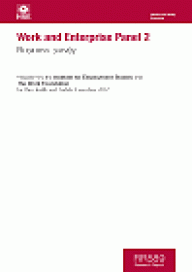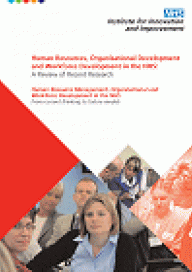Publications
 We author and publish a range of resources to keep you up to date with the latest developments in employment, labour market and human resource policy and practice.
We author and publish a range of resources to keep you up to date with the latest developments in employment, labour market and human resource policy and practice.
All our pdf publications are free to access.
-

Work and Enterprise Panel 2
Business Survey
Cowling M (IES), Bevan S (Work Foundation) | Sep 2007 | Health and Safety ExecutiveThis report provided information on UK business attitudes, intentions and performance relating to health and safety in the workplace in 2007. In addition, it provided robust empirical evidence concerning linkages and impacts of health and safety strategy and expenditure on an array of hard and soft performance measures of intermediate and final business performance.
-

Human Resources, Organisational Development and Workforce Development in the NHS
A Review of Recent Research
Miller L, Broughton A, Tamkin P, Reilly P, Regan J | Sep 2007 | NHS Institute for Innovation and ImprovementThe NHS Institute for Innovation and Improvement (NHS Institute) commissioned IES to review and summarise existing research findings regarding the role of HR/OD in workforce development and to put forward suggestions for the further development of roles and activities of HR and OD practitioners in the NHS. This report is the outcome of that work.
-

IES Labour Market Overview 2007
Usher T, James L, Tuohy S | Aug 2007 | Institute for Employment StudiesThe IES Labour Market Overview provides information on the UK labour market in 2007. Bringing together key facts, figures and perspectives for employers and HR professionals, it also provides insights into labour market age, pay, qualifications, sectors, and occupations. User-friendly graphs give you at-a-glance information throughout; no need to trawl through tables and appendices.
-
📄
How can we encourage employers to become involved in education?
Miller L | Aug 2007 | Institute for Employment StudiesThe Edge Foundation worked with the National Education Business Partnership Network and Business in the Community to examine ways of making it easier for more employers to get more involved in education, more often. This essay prepares an overview of some of the issues, poses some questions to provoke further debate, and identifies some actions that would encourage employers to become engaged in education and training.
-

Pakistani and Bangladeshi Women's Attitudes to Work and Family
Aston J, Hooker H, Page R, Willison R | Aug 2007 | Department for Work and PensionsThis study explores Pakistani and Bangladeshi women's attitudes towards education and employment, and how their views around family, marriage and children fit with and shape these. The research was qualitative, and consisted of 60 in-depth interviews with women living in a number of major cities across Great Britain.
-

Managing Sickness Absence in the Police Service
A Review of Current Practices
Hayday S, Broughton A, Tyers C | Aug 2007 | Health and Safety ExecutiveThe Home Office and the Health and Safety Executive (HSE) commissioned this review of absence policies and management in seven police forces. It presents an in-depth analysis of absence management in the case study forces and identifies the clear themes and issues which are vital for the effective management of absence.
-

An Evaluation of the Local Authority Programme Joint Authorisation Pilot Project
Transfer of enforcement responsibilities in the motor vehicle repair and dry-cleaning sectors
Wilson S, Tyers C | Aug 2007 | Health and Safety ExecutiveDuring 2006 the Health and Safety Executive (HSE) ran a pilot initiative at Peterborough City Council which involved handing over inspection responsibilities from HSE in two industrial sectors. This transfer was the first of its kind: neither HSE nor the local authority had prior experience of a large-scale handover on a premises-by-premises basis. This independent report examines the effect of these pilot activities. It has two main components: a process evaluation which assesses the way in which the pilot programme has been delivered, the way in which staff have been supported, the challenges that they have faced, and the successes they have experienced; and an impact evaluation, leading to a costs and benefits analysis, which investigates the extent to which the service has resulted in a cost-effective improvement in outcomes.
-
📄
Qualitative Assessment of Jobcentre Plus delivery of the JSA and New Deal Interventions
Davis S, James L, Tuohy S | Jul 2007 | Department for Work and PensionsThis report presents the findings from a qualitative assessment of Jobcentre Plus delivery of the Jobseeker’s Allowance (JSA) and New Deal (ND) interventions. The research, which involved interviews with staff from three Jobcentre Plus districts, explored how delivery might differ from the ‘prescribed’ model, and how that might impact on performance.
-

Young Mothers Not in Learning
A qualitative study of barriers and attitudes
Dench S, Bellis A, Tuohy S | Jun 2007 | Institute for Employment StudiesCare to Learn is a UK government initiative that provides financial support for teenage parents who want to continue in, or return to learning. It helps with the cost of their childcare and travel. The report explores these mothers' attitudes to learning, and the examines the range of barriers - practical, emotional and motivational - that restrict their access to learning.
-

Learning Provision for Young Parents
A survey of learning providers
Dench S | Jun 2007 | Institute for Employment StudiesCare to Learn is a UK government initiative that provides financial support for teenage parents who want to continue in, or return to learning. It helps with the cost of their childcare and travel. This report explores the extent to which learning providers are engaged with teenage parents and Care to Learn, and the extent to which they are addressing the specific needs of young parents. The data suggest a relatively high level of flexibility and provision for young parents, even within institutions that rarely engage with this group.
